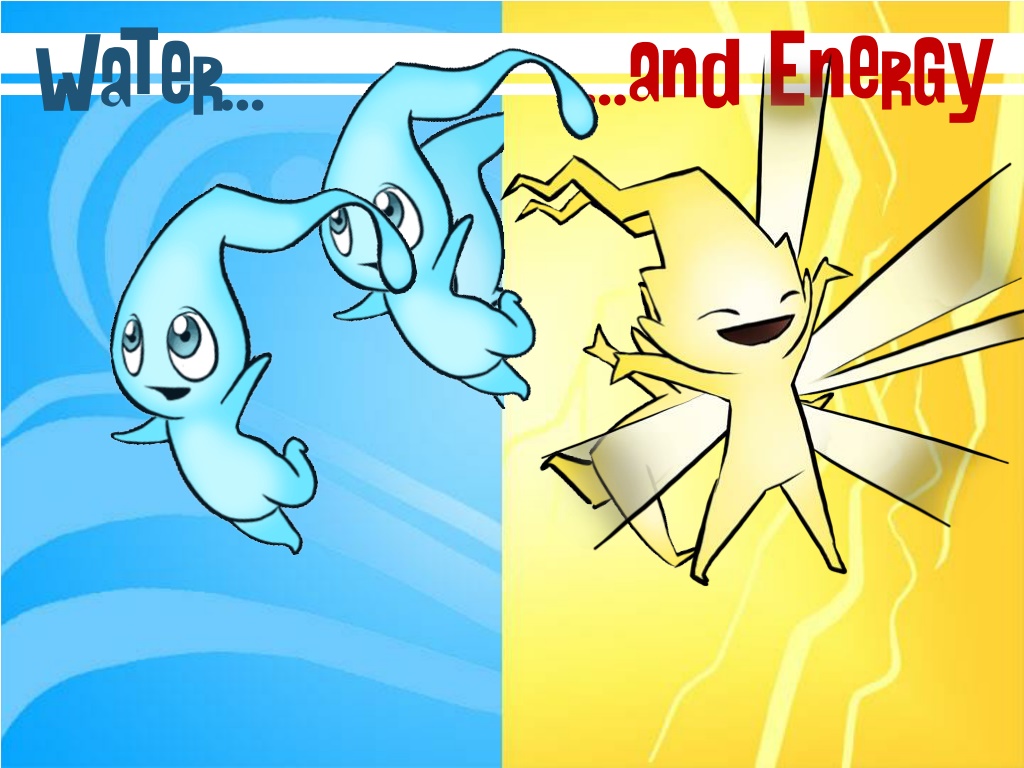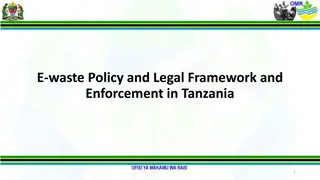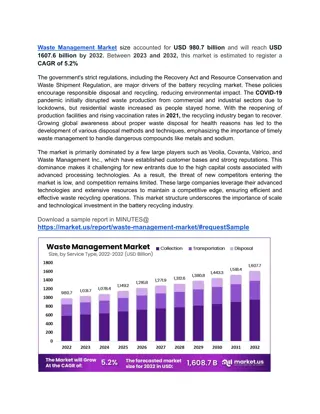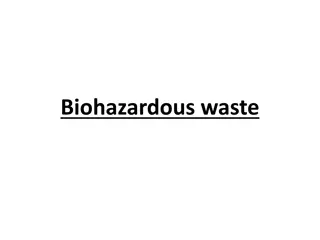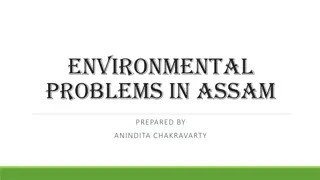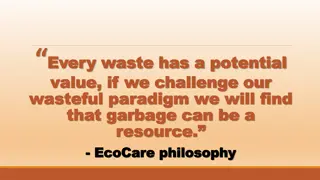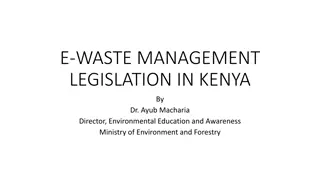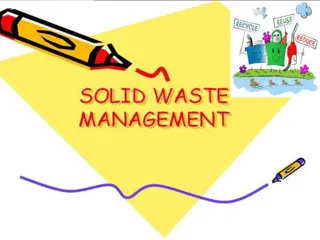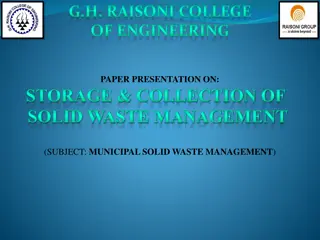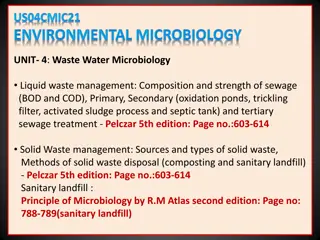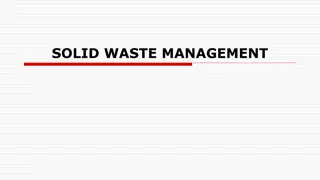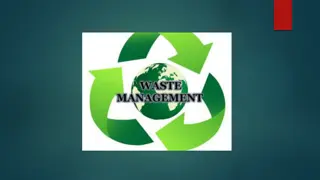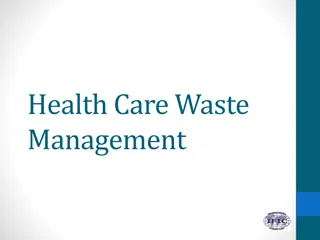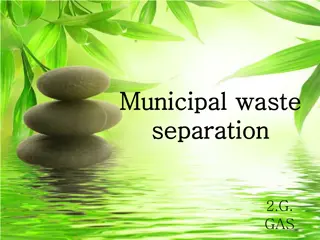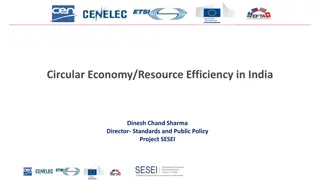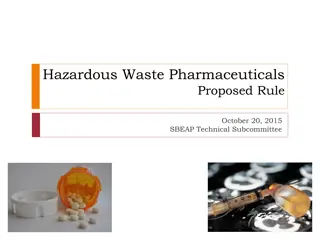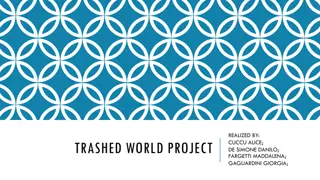Understanding Waste Management: Facts and Solutions
In this informative content, the importance of energy conservation, water preservation, and waste management is highlighted. It sheds light on the limited availability of usable water on our planet, the need for renewable energy sources, and the impact of waste generation on the environment. Learn about waste types, the significance of reducing waste, and the waste production statistics in the United States. Take action to help protect the planet for future generations by making conscious choices in energy usage, water conservation, and waste disposal.
Download Presentation

Please find below an Image/Link to download the presentation.
The content on the website is provided AS IS for your information and personal use only. It may not be sold, licensed, or shared on other websites without obtaining consent from the author. Download presentation by click this link. If you encounter any issues during the download, it is possible that the publisher has removed the file from their server.
E N D
Presentation Transcript
...and Energy Water...
...and Energy Water... Only 3% of the water on this planet is usable. We need energy for everything we do. You can help preserve water for future generations by conserving the amount of water you use. We can help our planet by using Renewable Energy to power our vehicles and our homes.
Waste Waste and and Waste Management Waste Management
What is Waste? Waste is using something carelessly
Waste is... To Squander
Waste is... Discarded and unused materials
Waste is... Pollutants and chemicals
Waste is... Materials that aren t being used
Waste I.Q. How much trash does the average person in the U.S. throw away every day? a. 1 lb b. 2 lbs c. 5 lbs d.7 lbs d. 7 lbs
Waste I.Q. What country produces the most garbage per year? a. Mexico b. United States c. Spain d.China b. United States
Waste I.Q. The United States always falls in the top 5 countries that produce the most garbage. Mexico, China and Spain all produce large amounts of garbage every year, but the U.S. produces the most. The U.S. makes up only 5% of the population on the planet, yet consumes 30% of all the resources and churns out 30% of all the waste.
Waste I.Q. Garbage production in the U.S. has doubled over the last 30 years. About 30% of all U.S. products are only used once then thrown away. 95% of ALL plastic, 66% of ALL glass and 50% of ALL aluminum beverage cans do not get recycled; instead they get burned or buried.
Where does the waste go? Into our air Into our soil Into our water Sometimes to trash conversionand recycling plants Most of our trash goes to landfills
Where does the waste go? About 57% of all our trash is buried in landfills 95% of ALL plastic, 66% of ALL glass and 50% of ALL aluminum beverage cans do not get recycled; instead they get burned or buried. Just because you can t see the trash doesn t mean it s not a problem any more.
What is a Landfill? A landfill is a carefully engineered basin in the ground where we hide our waste. Landfills are like a double-lined bathtub the aim is to stop any waste leaking out into our water supply especially our groundwater. Bathtubs can often leak out in 2 ways from a crack in the bottom, or by flowing over the top.
Manufacturing plant Recycling center your homes Paper Glass Ewaste Trash pickup Metal plastic Retail Stores Transfer station Composting Landfill gas collection Waste to energy plant Landfill site To your homes!
Landfill Waste I.Q. How long does it take for a plastic bag, bottle or cup in a landfill to decompose? a. 1 year b. 5 years c. 20 years d.Hundreds of years d. Hundreds of years
Landfill facts The U.S. has 3071 active landfills, and over 10,000 old municipal landfills according to the Environmental Protection Agency Contaminated air and water from landfills is hazardous Municipal landfills can accept this hazardous waste under federal law. ALL landfills will eventually fail, and leak this hazardous waste into the surrounding ground and surface water.
The Problem... Too much waste! We are running out of space for landfills. Very little of our solid waste is being converted into usable energy. Not enough people recycle. Recycling also consumes energy. People don t deal with waste appropriately!
Why we need to deal with our waste Our planet has limited resources. Less waste means we use less energy. Reduces water, soil and air pollution. There is no space left for our waste.
How you can make a difference We need to better manage our waste. Reduce how much stuff we use. Reuse materials Recycle materials Share materials Composting Knowing what you should and shouldn t put in trash cans
Reduce your waste What ways can you think of to use less? Discipline ourselves to be less wasteful. Use less water Use less energy & electricity Do we need so much stuff? Do you always need new things, just because they are new? Print less copies Use less paper towels
Reuse materials What ways can you think of to reuse items you would normally throw away? Be Creative! Reuse materials for the same purpose. Take better care of your things so they can be used over and over again. One person s waste could be another s treasures. Rethink what you consider waste. There are creative ways to reuse materials.
Reusing materials Everyone can recycle old CDs: CD Clocks CD garden wind chimes to keep birds away CD furniture!
Recycling Waste Can your waste be recycled? Look for a recycle symbol! Know what can be recycled, and what can t be recycled. Choose products that can be recycled, or are made from recycled content.
Recycling Waste The U.S. only recycles 27% of our waste do you think we recycle more or less than other countries? Countries like Japan and all of Europe have set higher recycling goals. In the U.S., San Francisco is leading the charge with how much they recycle at almost 69%. We need to be as good as SF, right?!
What can be recycled? For curbside pickup: Paper Plastic Aluminum Steel Glass
What can be recycled? Take to special recycling stations: Batteries Paint Oil Fluorescent lamps Thermometers Electronics
Why make compost? Compost provides nutritive soil for gardens and orchards Composting is an inexpensive way to enrich soil Composting in gardens requires less water
Composting Recipe Air, Water, Plants & Biodegradable materials
How to make Compost Good for grass clippings/green yard waste Food scraps like fruit and vegetable skins Add brown leaves + shredded paper for carbon Do not compost meat or pet droppings Avoid pesticides + herbal treated materials Turn pile as often as possible Keep compost damp, but not wet Bugs + worms are OK
Sharing We can share books, videos & CDs Donate things we don t need to others Or take to thrift shops Consider wearing clothing used by others Develop a share co-op for school
What items can we NOT reuse? Some things are considered true waste Waste must be disposed of correctly Some examples are: Incandescent light bulbs Used medical supplies Unused paint or chemicals Special items need to be verified
Whats it like to be waste? Pretend that you are a piece of waste What do you look like? How does it feel to be thrown away?
Who can [produce the least waste? Work in a small team You will receive a bag of trash what others call waste Sort the trash and eliminate/save as much as possible Use the methods we learned for reducing waste: REDUCE, REUSE, RECYCLE, COMPOST, SHARE Know what does need to go into the trash bin
Waste Busters! Points: REUSE: 10 Points RECYCLE: 3 Points COMPOST: 8 Points SHARE: 10 Points DISPOSE in trash if required: 0 points DISPOSE in trash but NOT required: -2 points
Waste Busters! Examples .
